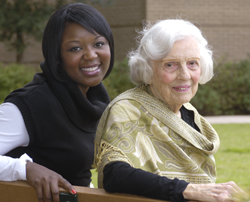For Elizabeth Newton, benevolence was shaped by her parents’ example
June 7, 2010

Kim Butler is the recipient of a scholarship funded by Elizabeth Newton.
This is another feature in a series of reports on the people who have shaped the Arnold School of Public Health as it celebrates its 35th anniversary in 2010.
“How wonderful it is that nobody need wait a single moment before starting to improve the world.” – Anne Frank
Elizabeth Newton has never lived her life waiting in the wings for an opportunity to help others.
Her generosity was rooted in her childhood, and her unfailing commitment to service appear to be part of her genetic makeup. As a child growing up in Charleston, she learned the gift of giving from her parents. The Great Depression was wreaking havoc on the lives of many in her city and state, and her father, an accountant, worked long hours to help his clients. Yet, he never overlooked an opportunity to share what he could with others.
“If some people bought a new chair, they might store the old one in the attic,” Ms. Newton said. “If we got a new chair, my parents gave the old chair to someone who needed it. I saw what my parents did, and the example I saw interested me in helping other people.”
An afternoon spent over dessert with this delightful 92-year-old benefactor is a tonic itself. No one can share her presence without wishing that her optimistic spirit, coupled with her candid commentary on current events and witty tips of practical advice, could be bottled and sold!
Her family stories tell why Ms. Newton has established a graduate fellowship in the Arnold School of Public Health’s Department of Health Promotion, Education and Behavior to ensure that deserving students have the opportunity for an education – especially one that will benefit the health of children and adults throughout South Carolina and the nation. The fellowship is intended specifically for students interested in providing health-related services to underserved areas in the Palmetto State.
As an “observer of education,” she said, “it became apparent to me that people who haven’t had a good education are never going to make it. I was fortunate. I had great teachers.”
Her teachers made such an impression on the young Elizabeth Newton that she didn’t play with dolls. She spent hours teaching her dolls at home.
“I had the most educated dolls anywhere,” she said, with a laugh.
Her parents, who both had college degrees, were determined that Elizabeth and her younger sister Martha would attend college, even with the financial constraints of the Great Depression.
When her father was asked, “Why are you going to send a girl to college?,” he simply replied, “I don’t have any boys.”
Ms. Newton earned her bachelor’s degree from Furman University and began her career teaching teens and young adults at Greenville High School in 1939. Later, she taught classes for soldiers at Fort Jackson. Even when she retired at age 64, Ms. Newton continued working in education programs for international students at First Baptist Church in Columbia, where she sings alto in the Senior Choir.
Her focus on public health education also is grounded in her family’s life and lessons. Ms. Newton’s mother was an early advocate for what we now know as the Mediterranean Diet. The family ate small amounts of meat, but always had three vegetables and a salad.
“We never had a piece of fried chicken,” she said, explaining that her mother prepared delicious meals that remained true to the cuisine of her French ancestors.
The family ate breakfast together, after which the young Elizabeth set out to walk to school. “I walked and skated everywhere,” she said. “We didn’t have colds. My parents thought you went to the doctor only when you were about to die. We did everything we could to prevent sickness.”
In fact, Ms. Newton went from elementary school through high school without ever missing a day because of illness.
She believes that people should advocates for their healthcare. With so much health information available today, people have to keep up with what’s going on – even questioning whether specific medications are right for them.
“There’s nearly a change a day,” she said about the health information that’s available for consumers. “Some of it’s good. Some of it’s not so good.”
She never imagined that she would be considered a philanthropist, although she finds herself among an impressive group of generous donors. A 2009 article in Forbes magazine reported that women control more than half of the wealth in the United States and make 80 percent of the purchasing decisions. A study from Barclay’s Wealth last year found that U.S. women give an average of 3.5 percent of their wealth to charity, while men give an average of 1.8 percent.
But Ms. Newton takes all of that in stride, preferring to downplay the significance of her philanthropy.
“I saw my father give his services to people who needed them. My mother was generous, too. It’s something I saw in front of me. It was perfectly natural,” said Ms. Newton, whose story of giving is featured in the Spring Issue of the University’s Carolinian magazine.
Nevertheless, the quiet lessons in philanthropy that Ms. Newton learned nearly 100 years ago will influence many lives in the 21st century.
And, from her parents’ example, Elizabeth Newton has established her own example of benevolence that is being passed to a new generation of philanthropists – and public health professionals.



_01.jpg)
_02.jpg)